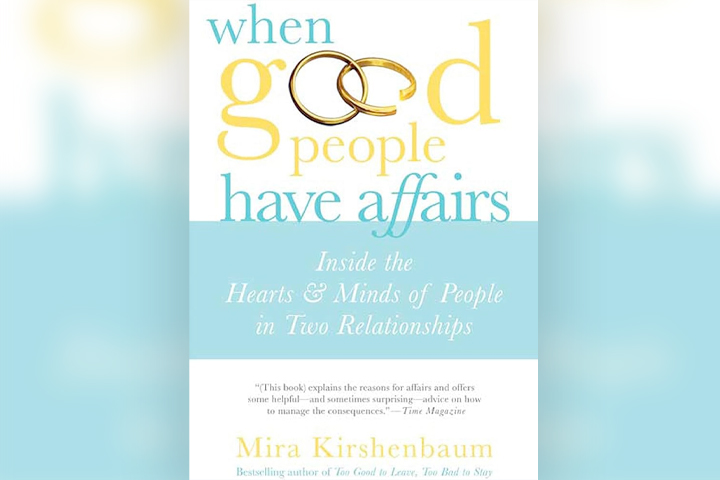A client asked me to read When Good People Have Affairs, by Mira Kirshenbaum. It’s a great book and I’ve already recommended it to a couple people. It’s unusual in that it’s written for, and from the point of view of, the person having the affair (rather than the victim—the person cheated on), and from a very non-judgmental and fresh perspective.
Why is this noteworthy? Think about a time you found yourself in a position of being involved with more than one person, or talked to a friend who is. Usually, the shame is so huge it can be hard to discern what to do or make any kind of choice. Kirshenbaum takes this dilemma head on by diving beneath the shame, helping the reader sift out what is really going on, how they got into the dilemma—and then how to compare apples to oranges in making a decision about what to do.
But there’s something else I really like about the book. It’s about choosing a partner, period.
In my work, I encounter folks unhappy in relationships and unhappily single looking for relationships. They’re often mystified why things don’t work out for them, and they blame themselves for being problematic, boring, or just somehow wrong and unlovable. Maybe you’ve felt this way.
But what if the issue is simply chemistry, and no one’s ever taught you the basics of good relationship chemistry?
There are 5 ingredients, Kirshenbaum says, that make up good relationship chemistry. Essential chemistry. If even one of the 5 is missing, the relationship is doomed. As Kirshenbaum states: “The bad news is that you need all five. Though you don’t need a lot of all five, you do need a passing score for each.”
I say the good news is that once you look at your relationships through these 5 ingredients, you’ve got a big leg up on developing clarity about how, when and where to invest in a relationship—and that’s huge!
The 5 are:
* Easy Connections
* Fun
* Safety
* Mutual Respect
* Physical Chemistry
Take a moment to reflect on your relationships, current or past, through the lens of these 5 ingredients.
Easy Connection
It’s as simple as this – do you feel comfortable, at ease, cozy with this person? Can you be yourself? Do you relax in their presence? Does being with them create an environment where you feel that more of yourself can come out and play? Or do you feel tense, on edge, and careful around them, afraid to say or do the wrong thing?
What about talking? Can you speak easily, does conversation flow? Can you talk about things that matter to you? Can you talk about hard stuff? And vice-versa—does your partner have the same ability, feel comfortable as well?
Kirshenbaum puts it this way: “Too often we have only one or the other in a relationship. Things are easy, but we don’t connect. Or we connect, but things aren’t easy. When you have the ingredient of chemistry, you have both.”
Look for both. That’s the key.
Fun
Life is hard and stressful for many. Forget fun–most of us are happy if we can just take the stress down a few notches, right? But in truth, fun is the glue of relationships. Here’s the question: in the absence of manufactured fun (like a party, a vacation, a concert, an event) or intensity (great sex, emotionally intimate conversations) – can you and your partner reliably find ways to spend time together that are enjoyable? How much do you really like each other’s company? Kirshenbaum clarifies that it doesn’t have to be fun all the time, or a big deal in any way. It can just be a glance between the two of you, a shared moment, an inside joke. But regular doses of fun, and the feeling that fun can spontaneously emerge, regularly, is essential ingredient #2.
Safety
We’re not talking about fear of physical abuse (a deal breaker if that’s in place). We’re talking about emotional safety. Trust, respect, feeling included, comfortable and cherished by your partner.
Do you rationalize away the things that erode safety? I’m talking about the so-called “little” things, like a pattern of not calling when they said would. Making a cutting comment (or a joke that feels cutting) if you put on some weight. Dismissing your suggestions. Asking for advice and then rejecting it. Creating an ordeal if you bring something up to talk about. Putting you down in little ways. Getting really mad if you make a mistake. Or creating an atmosphere where you just don’t know where you stand or what is going on with the other person.
It’s not that you should feel 100% safe all the time. People screw up and step on each other’s toes. Once in a while, they might say something mean in the heat of an argument.
Intimacy can be unnerving, and as my clients always hear me say: “There is no intimacy without conflict and vulnerability!” But in general, you need to feel safe, comfortable, and that you can reliably bet that you won’t be put down, belittled, misled or lied to.
The question is—do you feel safe from being hurt emotionally? And especially when you feel vulnerable—do you feel your partner gets that and takes care of you and your feelings? Emotional safety is essential ingredient #3.
Mutual Respect
Kirshenbaum says that at the heart of respect is whether you believe your partner makes good decisions.
It’s easy to blow this one off, especially if you fall prey to the illusion that your partner has amazing potential. But without respect in the present, your relationship can’t survive.
Your partner doesn’t have to be THE most brilliant and capable person around. But you have to basically like what you see. Today.
Right now: Is your partner a solid person? Capable, smart, reliable and kind? Do you like the decisions you see him/her make? Not just in your relationship but in his/her life? And does he or she treat you as if you are a solid, responsible, kind and smart person just as you are, instead of hoping you’ll change?
Without a yes to those questions, here’s what happens: the relationship can limp along for a while, but you’ll eventually marginalize your partner or they you. So without a yes — keep looking. You need a partner you respect. Period.
Physical Chemistry
Sometimes people congratulate themselves on not being superficial and “not caring” about their partner’s looks or the physical side of the relationship.
But if you make the mistake of minimizing the importance of your physical chemistry, you will be unhappy. It’s not that they have to be the most beautiful specimen or that the two of you have to have the best sex you’ve ever had. But you have to like your partner physically. You have be pleased to look at them, like the way they smell, the way their skin feels against yours, and the way they touch you. Even if you have the other 4 – without this basic physical chemistry, you’ll find yourself repulsed eventually. Remember: they don’t have to be perfect. Just right enough for you, and you for them.
So there you have it. The 5 essential ingredients for a happy, successful relationship.
Personally, it was so interesting for me to think back on my old relationships (before I met my husband). Through the lens of this list, it’s more clear to me now why they didn’t work out. And more clear to me than ever why my husband and I are a good match.
What do you think? Is this a helpful list?
For those of you looking – does this seem like a helpful lens with which to view your choices?


